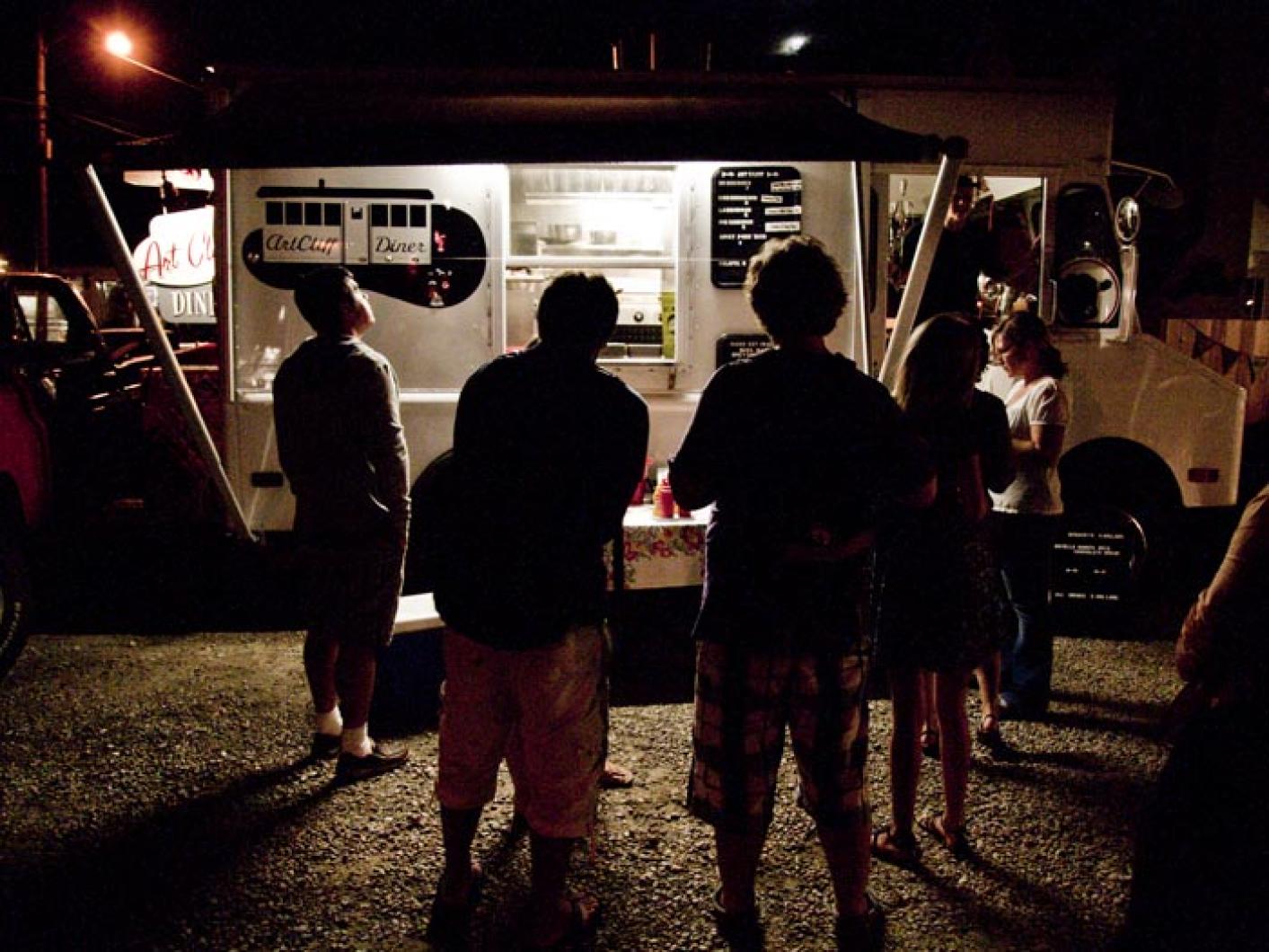Have truck, will travel — or better yet, follow your nose.
That’s the idea behind the growing food truck obsession across the country — in a culture where people are constantly on the go, so is our food.
The Vineyard is the latest place to pick up on the trend. While it may seem like a natural fit for a food-loving Island to get on the bandwagon, when it comes to the rules and regulations it’s not as easy as it looks.
But it’s definitely catching on. As of this weekend there will be three food trucks on the Island serving hot food — the already-established ArtCliff Diner truck, a new Jamaican jerk chicken truck, and a hot dog cart, all in Vineyard Haven.
Added to that list are three existing lemonade and prepackaged food carts at Joseph Sylvia State Beach in Oak Bluffs, where there is currently a cap on peddler permits.
The biggest hurdle for food truck enthusiasts is not necessarily the permitting process required by the towns, but the need for a commercial kitchen — without a home base to store and prepare the food, there can be no truck.
Health agents across the Island say they get calls throughout the year, especially before summer, inquiring about the permitting process for mobile food trucks. Maura Valley, assistant health inspector in Tisbury, reports an increase in inquiries this year.
“We have a few people come forward with actual proposals but when I explain they still need the commercial kitchen in a building, a lot of them don’t go forward with it,” Ms. Valley said. “They back off.”
For ArtCliff Diner owner Gina Stanley, a commercial kitchen for her food truck was already in place, and in 2007 she opened the first food truck on the Island.
“The town was very helpful, I guess, because it had never been done before,” Ms. Stanley said in a phone interview. “I was the first one to come at them with a food truck. It was definitely a learning process.”
A catering permit is also needed for food trucks.
Parking restrictions also apply. Ms. Stanley’s 1984 truck must be parked on private property and can only operate when the diner is closed. And while she does go on the road with her truck for special events, for the most part she prefers to keep it parked outside the diner. The ArtCliff food truck is open until midnight on weekdays and 2 a.m. on weekends, doing a brisk trade in falafels, pork tacos, lamb burgers and homemade doughnuts.
“I like the fact it’s at the diner, it works for me,” Ms. Stanley said. “We’re so busy it’s nice to work out of the kitchen, and at the same time people can experience the diner, too.”
Future food truck vendors beware: the permitting process is lengthy. Several town governing boards, including the selectmen, planning board and zoning board of appeals, must be cleared, and the truck must meet the requirements of the 1999 federal Food Code and the state Department of Public Health, which has a entire section dedicated to mobile units.
Edgartown health agent Matthew Poole said the rules are identical to those required for a restaurant, and in some cases more strict.
“Properly inspected trucks can be solid and sound, those trucks are good. The truck is not the problem,” Mr. Poole said. “With a truck there’s no mystery what equipment they’re using to support the operations; it can be inspected, held to code and is equipped to meet or exceed health codes.”
And Ms. Stanley said operating a food truck is still running a food business, which means working hard for the money — extra hard. “It’s a bunch of labor before and after the food cost,” Ms. Stanley said. “You still have to do the prep and cooking in another kitchen so it’s almost like a catering job . . . then you have to break down the truck, clean the kitchen, clean the truck, change the oil [in the truck]. It’s a lot of work and a lot of hours. We usually don’t get out of here until 4 or 4:30 [in the morning] and then you have to get ready for the next day.
“I feel blessed. It’s been a great success, I feel like I can’t keep up with it,” she continued. “It’s like a cult, and if it’s not open the cult gets angry.”
For others the food truck remains an elusive dream. Tim Laursen and Everett Whiting, owners of Local Smoke, a huge hit at the Martha’s Vineyard Agricultural Fair with its farm-raised chicken and pork barbecue last summer, aspire to own and operate a food truck but have no commercial kitchen.
“We’re stone masons and a carpenter, we’re not businessmen,” Mr. Laursen said. “We’re really on the hunt to find someone we could share a kitchen with . . . a food truck would be fun. We’d love to do something like that.”
Peter Simon, his son Willy and their partner, Melody Cunningham, will be using the kitchen at the Scottish Bakehouse to prepare food for their new truck, Irie Bites, this summer. The truck, which will sell authentic Jamaican jerk chicken prepared six ways, is set to open this weekend.
“It’s a lot of work,” said Ms. Cunningham this week, standing in the shiny new truck days before the launch. “You can’t mope and groan, you just have to put your elbow in and do what you’ve got to do. You have to be dedicated,” she said.
The truck will be parked at three locations — in a small courtyard on Main street in Vineyard Haven, at Veterans Park and outside Nectar’s at the airport most nights.
“It’s going to be fun and enjoyable food and vibes right in downtown Vineyard Haven,” Peter Simon said.
Follow them on Facebook or Twitter, or just follow your nose.





Comments
Comment policy »